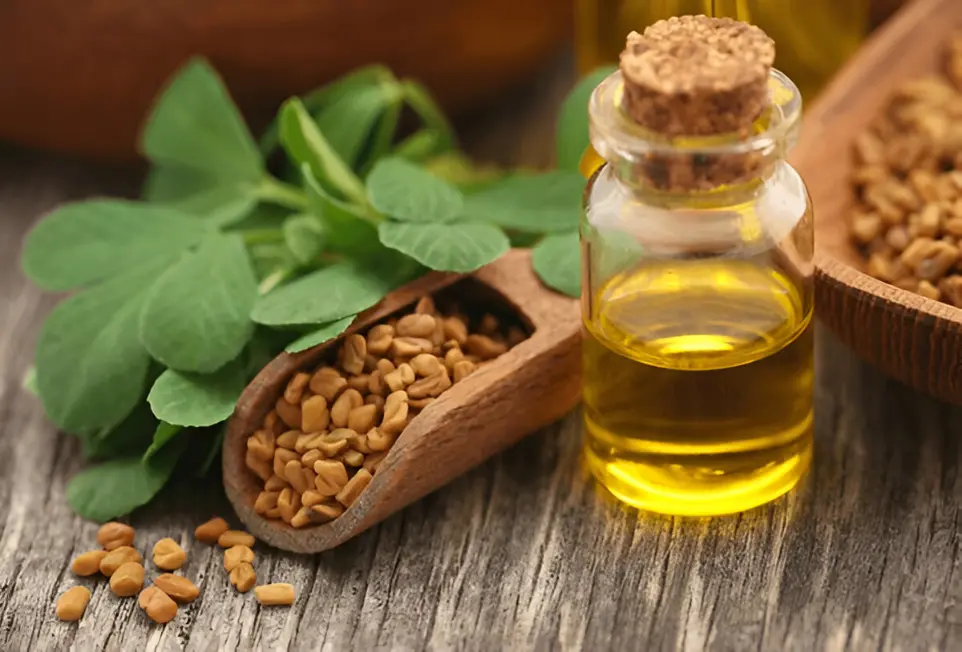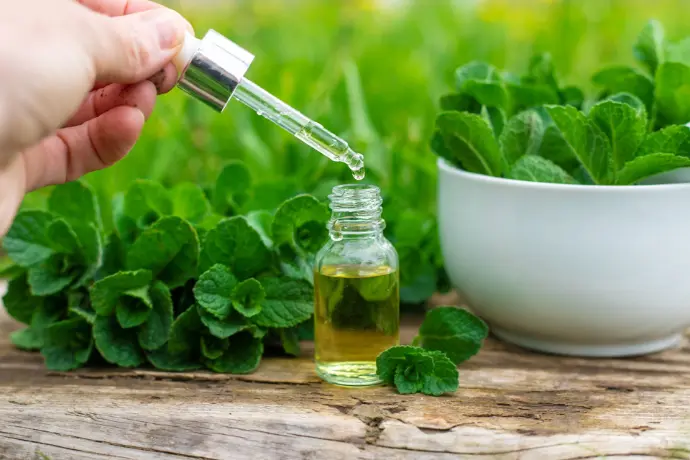About Product
Fenugreek oil is extracted from the dry seeds of a plant with leaves shaped like small obovate to oblong leaflets, part of the Fabaceae family. This plant is grown as a semiarid crop all over the world. Its seeds and leaves are common ingredients in dishes from the Indian subcontinent. The Fenugreek plant originated in India and parts of Northern Africa. The oil is extracted using Super Critical Fluid Extraction green technology method, which uses carbon dioxide as a solvent. Fenugreek oil has a sweet and nutty flavor profile: light yellow to reddish-brown color oil consists of b-pinene, 2,5-dimethylpyrazine, 6-methyl-5-hepten-2-one, camphor, 3-octen-2-one, β-caryophyllene, neryl acetate, β-selinene, and geranial.
With such constituents it is obvious that fenugreek oil has great medicinal properties along with culinary qualities. Fenugreek has good effect for controlling Kapha disorders; however, less effective with Vata but can increase Pitta dosha. It acts as a warming spice and contributes bitter, pungent, and sweet tastes to food. In Ayurveda medicine, it is used for improving digestion and preventing various stomach disorders.
Fenugreek oil is praised for its strong antioxidant and anti-inflammatory properties. Additionally, it may help with inflammation, cholesterol, and appetite control. Fenugreek oil can also boost testosterone levels, support breastfeeding mothers by increasing milk production, and even lower blood sugar levels.
You can treat acne, skin irritation, dry skin, wrinkles, and boils using fenugreek oil. Traditionally, fenugreek seed paste has been used for skin whitening and treating acne.
Composition
- Furostanolic Saponins: These compounds contribute to fenugreek oil's anti-inflammatory and health-promoting effects.
- Alkaloids: Known for their ability to support digestion and boost overall health.
- Flavonoids: These antioxidants protect cells from oxidative damage and contribute to the oil’s healing properties.
- Galactomannan: A type of carbohydrate that is thought to contribute to fenugreek oil’s anti-inflammatory and digestive health benefits.
Physical Characteristics
- Appearance: Light yellow to amber liquid.
- Odor: Earthy, warm, and slightly bitter, with a slight sweet note reminiscent of maple syrup.
- Taste: While fenugreek oil is not typically consumed directly, it has a bitter, nutty taste and is used in small quantities in cooking.
Health Benefits
- Digestive Support: Fenugreek oil helps relieve bloating, indigestion, and constipation by stimulating digestive enzymes and promoting overall gut health.
- Anti-inflammatory Effects: The oil’s anti-inflammatory compounds, such as furostanolic saponins, make it effective for reducing inflammation in the body. It is used to relieve symptoms of arthritis, muscle pain, and joint stiffness.
- Hormonal Balance: Fenugreek oil is traditionally used to promote hormonal balance in women. It may help regulate menstrual cycles, alleviate symptoms of PMS, and support lactation for nursing mothers.
- Hair Growth: Fenugreek oil stimulates hair follicles, improves scalp circulation, and helps reduce hair loss. It is used to promote healthy hair growth and prevent dandruff.
- Blood Sugar Regulation: Fenugreek oil may help regulate blood sugar levels by improving insulin sensitivity, making it beneficial for individuals with diabetes or those at risk of developing the condition.
- Skin Health: Fenugreek oil’s antimicrobial properties help treat acne, reduce skin irritation, and promote a healthy complexion. It is also effective in treating eczema and other skin conditions.
Fenugreek Oil is multipurpose beneficial for medicine, pharmacy, and even as a flavoring agent in the food industry.
Moreover, Fenugreek oil offers considerable anti-oxidant and anti-inflammatory properties. It also displays anti-fungal, anti-carcinogenic as well as regenerative properties.
The chemical constituents of fenugreek oil include b-pinene, 2,5-dimethylpyrazine, 6-methyl-5-hep- ten-2-one (camphor), 3-octen-2-one, b-caryophyllene, neryl acetate, a-selinene and geranial which are part its composition.
Key Features
- Source: Derived from the seeds of the Trigonella foenum-graecum plant (fenugreek).
- Active Ingredients: Furostanolic saponins, alkaloids, flavonoids, galactomannan.
- Appearance: Light yellow to amber liquid with an earthy, slightly bitter fragrance.
- Applications: Used in culinary, skincare, hair care, wellness, and aromatherapy products.
- Health Benefits: Supports digestion, relieves inflammation, promotes hair growth, regulates blood sugar, balances hormones, and improves skin health.
Application
Culinary Uses:
- Flavoring Agent: Fenugreek oil is used in cooking to impart a bitter, nutty flavor to dishes. It is a common ingredient in Indian cuisine and can be added to curries, stews, soups, and spice blends.
Cosmetics & Personal Care:
- Skin Care: Fenugreek oil is widely used in skincare for its anti-inflammatory and antimicrobial properties. It helps treat acne, eczema, and other skin conditions by reducing inflammation and promoting healthy, glowing skin.
- Hair Care: Fenugreek oil is used to promote hair growth, reduce hair thinning, and treat dandruff. It stimulates blood flow to the scalp and nourishes hair follicles, improving hair strength and shine.
- Massage Oil: Fenugreek oil is often included in massage oils to relieve muscle pain, joint stiffness, and tension. Its anti-inflammatory properties make it effective for soothing sore muscles and improving circulation.
Health & Wellness:
- Digestive Health: Fenugreek oil is known for its ability to support healthy digestion. It helps alleviate bloating, indigestion, and constipation, and stimulates the production of gastric juices.
- Anti-inflammatory: Fenugreek oil has natural anti-inflammatory properties, making it effective in treating conditions like arthritis, muscle pain, and joint discomfort.
- Blood Sugar Regulation: Fenugreek oil is believed to help regulate blood sugar levels, making it beneficial for those with diabetes or insulin resistance.
- Hormonal Balance: Fenugreek oil has been used traditionally to support hormonal balance, particularly for women. It may help with menstrual discomfort and promote lactation in breastfeeding mothers.
ALSO ACT AS A
- Flavoring Agent: As an ingredient with culinary uses medicinal use cosmetics fenugreek oil serves professionally as flavoring agent.
- Aromatic Agent: For aromatherapy Fenugreek Oil is the most known aromatic liquid. Eunemia Fenugreek has gained importance in Pharmaceutical preparations & Ayurveda for treatment of dry skin boils hair loss and other topical applications which require soothing agents makes it useful cosmetics therapeutics.
- Therapeutic: Therapeutic effects of fenugreek oil are control of appetite, cholesterol levels heartburn some inflammation and blood sugar lowering medicines enhancing testosterone secretion breastfeeding milk supply increase.
- Nutritional: As an antidiabetic , anticarcinogenic hypocholesterolemic , antioxidant , immunological activity fenugreek has lot to offer .As a food stabilizer , adhesive or emulsifying agent the oil acts extensively.

















